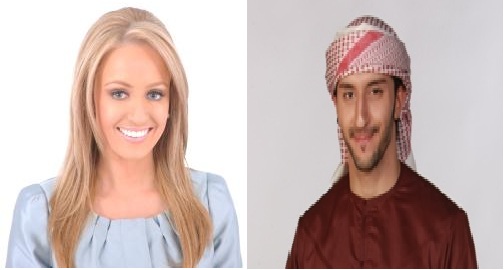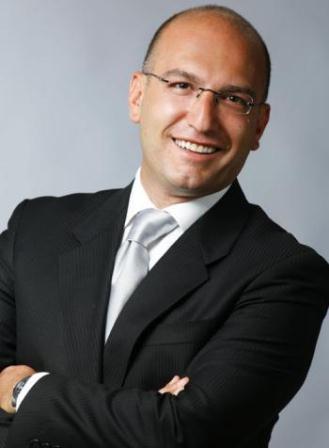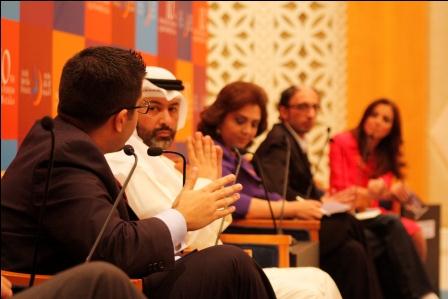
As the curtains came down marking the conclusion of the 10th annual Arab Media Forum (AMF) last week, it was quite evident that The Dubai Press Club (the body entrusted with organizing this event since its establishment) had it planned for guests, participants, speakers and reporters covering the event to leave with one clear message: a new era has arrived and the AMF is embracing it with arms wide-open.
(One of the panel discussions at the AMF 2011 - Source: Dubai Press Club)
The theme of this year's edition was 'The Arab Media and the Winds of Change', a clear nod to the recent revolutions which changed an otherwise boringly static region, with sessions dedicated to discussing the impact of social media on what has happened in the Middle East, how the image of the ordinary citizen has been affected globally and an afternoon dedicated to discuss the state of the Egyptian Media after the Revolution.
A Bigger Platform for Bloggers
Not holding back, the AMF gave a bigger platform than ever before to bloggers, social commentators and young entrepreneurs who launched some of the most interesting media start-ups in the region, such as Jordan's Wael Attili, co-founder of the Kharabeesh network and Yasser Al-Ghaslan, editor and founder of the specialized Arab media and communication blog, The Media Note.
It was unsurprising then to learn that the event witnessed an increase of approximately 17 percent in attendance this year as well as a whopping (by Middle Eastern standards) 23,000 people watching the Live Stream of all talks.
However, what certainly enriched the level of debate at the event was the mixture of both 'Old' and 'New Guard' -- so we also saw a vast number of the faces belonging to the worlds of print and television attend and part-take in the various talks.
Commenting on this noticeable change, Maryam Bin Fahad -- executive director of the Dubai Press Club said: "The Forum seeks to reflect the reality of Arab media, so it was only natural to have an increase in the number of bloggers who in their turn became a key element in the region's over-all media structure "
Misunderstanding Social Media
As a speaker who was invited to talk on the impact of social media, this interesting mix of attendees seemed quite healthy and useful to me, in particular it helped highlight some of the misunderstandings that still currently exist in the region regarding the changing landscape of our industry with people asking questions like "Who controls social media?" and "Can they be trusted?".
Indeed, many people who have attended the event seem to believe that it was social media that created the recent Arab revolutions and went to to believe that there is a 'Rupert Murdoch-Like' figure behind Twitter and Facebook who seems to have the ability to control what messages are sent across.
Ever the man who hits the nail on the head, UAE blogger and AMF speaker Sultan Al-Qassemi was able to set the record straight when he said that the role of social media was indeed exaggerated, "The cause was corruption, graft, lack of human rights and oppression of young Arabs", he added.

(Dubai One Presenters Katie Fielder and Omar Butti - Source: DMI)
As a speaker at the Forum, I endured to answer as much as I can during the debate itself and as a guest on Emirates 24/7, where I told the show's hosts Katie Fielder and Omar Butti that contrary to what many people seem to think, the Middle East is still very much a 'television-driven society' given that the latest figures of internet usage were at 40 million a year, whereas a channel like Al Jazeera Arabic gets that number of viewers every day.
A Symbolic Bow

(Zaven Kouyoumijian -- Source: zavenonline.com)
For his part, veteran TV presenter Zaven Kouyoumjian delivered a symbolic bow to Arab youth by allowing Nour Eldine Al-Yousef, a young and aspiring TV anchor from the UAE to present a special episode from Future Television (Lebanon)'s long-standing talk-show 'Sire Wenfatahit.'
Abdulwahab Badrakhan, a columnist who had attended the first ever AMF a decade ago said he definitely noticed an increased involvement of the youth in the past two years, adding that: "As a veteran, I feel slightly sad about my generation which did its best to play a role but at the same time I am very happy with the new generation which seems to be able to overleap a number of the challenges that faced us".
"The older generation had many frustrations; mainly that we didn't see the results of our work -- whereas the new generation at least managed to work hard and see the result, Tunisia and Egypt are an example," he concluded.
Not a 'Perfect Storm'
Despite allowing some strong winds of change to blow through it, the 2011 Arab Media Forum fell slightly short from being a 'perfect storm.'
I believe the 'State of Egyptian Media Post the Revolution' session would have been much stronger if the panel included a blogger of the calibre of Wael Ghonim -- rather than panel of the 'Old Guard' of Egyptain newspaper editors and TV presenters who all seem to have dodged the one question that really mattered: How is the ruling Military Council any different than the former regime of President Hosni Mubarak (infamous for silencing critics and the killing of blogger Khaled Said), when a few days after assuming power it (theCouncil) arrested blogger Michael Nabil Sanad for allegedly 'insulting the military'?

